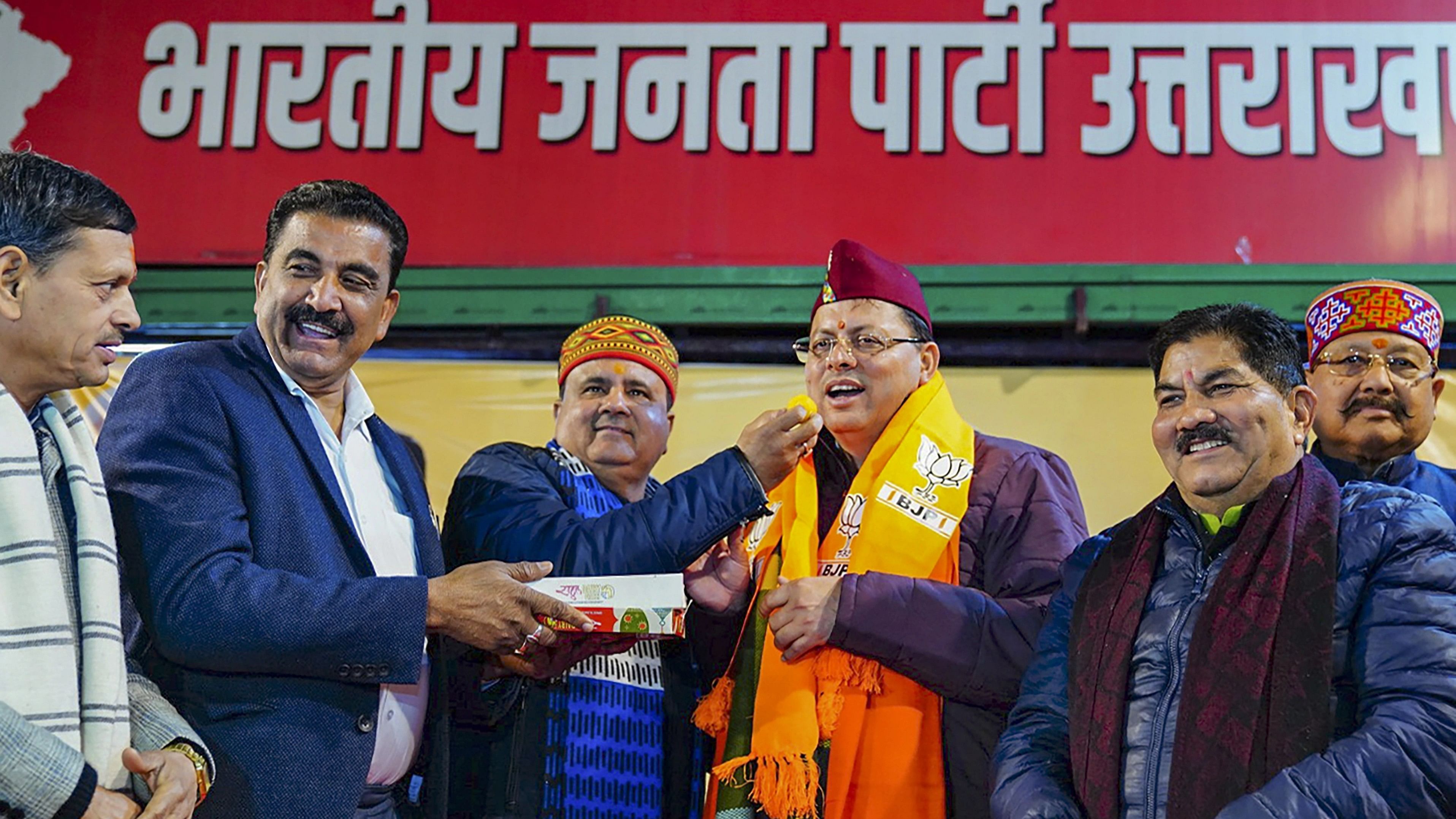
Uttarakhand Chief Minister Pushkar Singh Dhami being greeted by BJP leaders after the state Assembly passed the Uniform Civil Code Bill, at the party office, in Dehradun.
Credit: PTI Photo
Uttarakhand’s Uniform Civil Code Bill tabled in the assembly on February 6, is being seen as a precursor for entire India since a uniform code is one of the key ideological commitments of the Bharatiya Janata Party (BJP).
As we are on the cusp of a general election, the proposed law is both deeply political and profoundly ideological in its intent. It aims, quite clearly, to bait the Muslim clergy by seeking to reform Muslim personal law that is discriminatory towards women. Equally, it excludes tribals from the scope of the law, presumably because it does not wish to alienate the Adivasis who have their customary laws.
As many tribal communities are patriarchal in that inheritance is passed on to the male child, the question may be asked: should women from one section of society be denied equal rights? Why should the State, yet again, find another issue that puts the Muslim minority in the frame?
There is also something extraordinarily bizarre about another clause in the Bill. While supposedly offering equality in inheritance and divorce to all women (except tribals), it takes away freedom and liberty from all citizens. It demands that heterosexual participants in a live-in relationship must register at a police station. This is supposedly intended to protect women if they are abandoned. From the liberal perspective that values free choice (be it of changing partners, and not opting for marriage) this clause of ‘report at the thana’ is deeply discomforting.
Given the conservative nature of institutions and society, one could suspect that it is intended to discourage not just inter-religious coupling, but inter-caste as well, and makes it harder for young people to get out of the control of the family, the clan, and the khap. It would also enhance the scope for fellow citizens and neighbours to snoop and report adults living together, in a relationship or not.
One could, therefore, wonder of the intention behind bringing this Bill at this time is not just ideological/political. Behind the garb of seeking gender justice, this can be another step towards an organised conservative society. It also tests the response for bringing a UCC at a national level.
Meanwhile, it must be stated that all customary laws across the world have been written up by men who have not historically seen women as equal. Therefore, many men and women, including this author, may support the idea of a uniform civil code in principle because in civilised societies women should have equal rights in marriage, inheritance, divorce, maintenance, and custody of children.
Yet, given the politics of the day, one must be highly sceptical about the Uttarakhand UCC. Please note the sequence of events: Soon after the Bill was tabled in the assembly, Deputy Chief Minister of Uttar Pradesh Keshav Prasad Maurya said that after Uttarakhand, the UCC would be brought to his state at an “appropriate time”. Assam Chief Minister Hemanta Biswa Sarma said he would monitor events in Uttarakhand and bring in the UCC as soon as possible, but in the meantime, he would bring an Act to ban polygamy.
The BJP and its ideological parivar seem to be working on a tight schedule this year: Ram temple in January, UCC in February, the general elections from March to May. This regime epitomises the era of single-party rule decision-making under Narendra Modi as the UCC is one of the three issues that were kept out of the common minimum programme hammered out during the coalition era and the reign of the first BJP Prime Minister, Atal Bihari Vajpayee. The abolition of Article 370 has been achieved as has the construction of a Ram temple at Ayodhya; the UCC is now being pushed.
In terms of political narratives, the idea of uniting the country under a common law fits in with the projection of ‘One Leader, One Nation, One Election’ as Modi positions for a third term. The committee under former President Ram Nath Kovind has begun consultations on simultaneous Lok Sabha and state elections, so the UCC can also be seen in the broader framework of the attempts to have central control and uniformity in all aspects of the Republic.
Historically, the idea of uniform laws and reform of Muslim laws, has spun in directions that have been hugely beneficial to the BJP. A quick recap: the BJP was formed in 1980, but had no traction till the Shah Bano judgment in 1985, when chief justice Y V Chandrachud, father of the current Chief Justice, granted Shah Bano, a Muslim divorcee, maintenance in perpetuity, from her husband.
This angered the Muslim clergy as they argued this was interfering with their personal laws. They prevailed on then Prime Minister Rajiv Gandhi to overturn the judgment through a regressive law, named Muslim Women (Protection of Rights on Divorce) Act, in 1986. Suddenly, the BJP had an issue: the ‘pandering’ to Muslim males (never mind the injustice to women) by the Congress. Now nearly 40 years later, the issue has again come to life.
What’s changed since then, however, is that those who seek to enhance women’s rights are deeply suspicious of the BJP’s motivations. Therefore, progressive women’s groups now support reforms within communities and stress on maintaining diversity of customs and laws in a large country. Many of those who once supported the UCC from the gender perspective, now see it as being just another issue to posit the Muslim male in the frame to unite the majority community in an ‘Us vs Them’ narrative.
(Saba Naqvi is a journalist and author.)
Disclaimer: The views expressed above are the author's own. They do not necessarily reflect the views of DH.